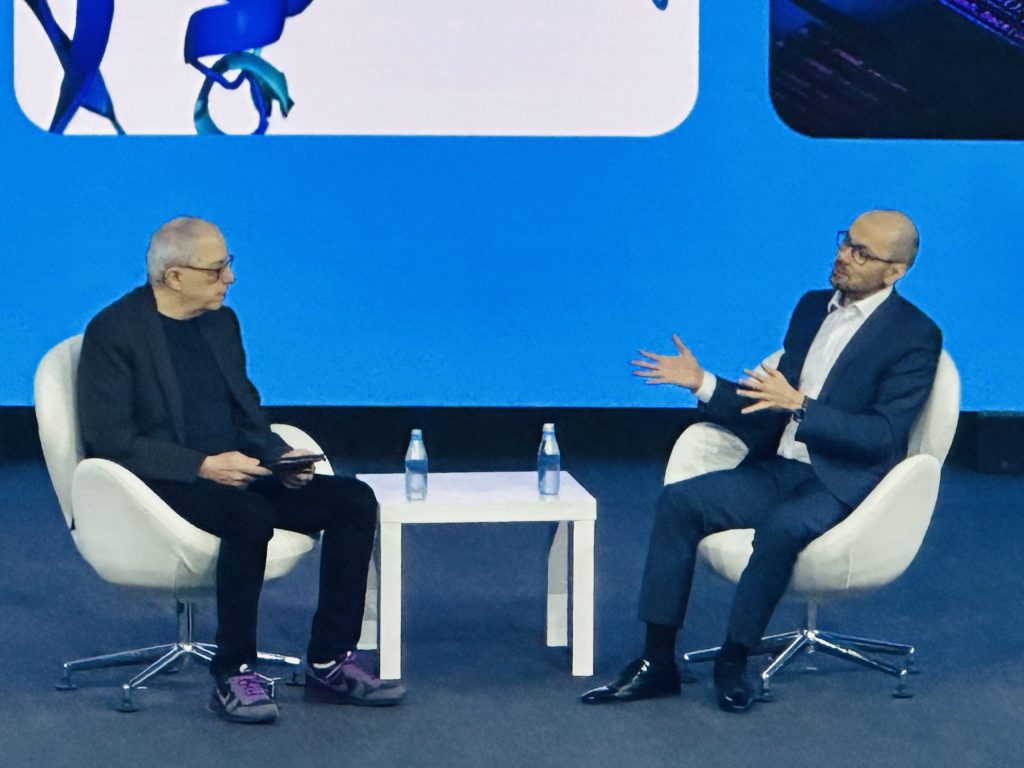One of the world’s leading AI researchers says AI-developed drugs that target proteins will become available in clinics within a couple of years.
Google DeepMind co-founder and CEO Demis Hassabis spoke about folding proteins, and AI-engineered drugs and cures in an enthralling live discussion at Mobile World Congress in Barcelona.
Dr Hassabis has been working in this area for years. In 2018 DeepMind launched an artificial intelligence program called AlphaFold which provides open access to more than 200 million protein structure predictions to accelerate scientific research.
In 2021 he founded Isomorphic Labs, a company that uses artificial intelligence for drug discovery. It was a spin-off from DeepMind. Dr Hassabis is CEO and founder.
He explained how predicting the folding of proteins is crucial to discovering medications and cures at the genetic level. It starts with the genetic sequence that describes a protein.
“Imagine that’s a sort of one dimensional string of letters, right? But when the protein gets made in your body, it folds up into a 3D structure. And the 3D structure is what determines its function in your body, what it does.”
He said that understanding the folding process of a protein had previously been “a 50-year grand challenge”.

“Because if you could, that will be enormously useful in drug discovery, understanding disease, understanding life and for 50 years, the whole biology field has been trying to solve this problem.
“And then, starting in 2016, and then 2018, 2020, we finally solved this problem, where we could predict directly in a few seconds from the genetic sequence, the 3D structure of the protein.
“There are 200 million proteins known to science and we’ve now folded all of them. It would have taken a billion years of PhD time what we did basically in one year using AlphaFold.”
He said it was fair to say that AlphaFold had revolutionised structural biology and life sciences. More than a million researchers and biologists around the world have used it. “We think that’s nearly every biologist in the world.”
He said he created the company Isomorphic Labs to pursue the discovery of drugs.
“If you know the structure of a protein, it also means that you can target a drug compound to bind to the surface, the relevant bits of the surface of the protein structure. Once you know the 3D structure, you can block it or otherwise change what the behaviour of what it does.
“So we’re now using AI again, to generate new chemical compounds that bind specifically to the exact part of the protein, but to no other proteins. You minimise the side effects in the body.
“And I think in the next couple of years, we’re going to start seeing AI designed drugs in the clinic.”
He said Isomorphic this year had signed deals with US drug maker Eli Lilly and Novartis, two of the world’s biggest drug companies. They would work on several real world drug design programs. The deal inked in January is reportedly worth US$3 billion.
“So it (AI) is really having a material impact now in drug discovery, and I hope that drug discovery will shrink from an average of 10 years to discover one drug down to maybe a matter of months to discover drugs to cure a terrible disease.”
Isomorphic Labs is one of several companies researching the use of AI-developed drugs. Some companies are already undergoing human clinical trials.
See also: Google admits being blitzed by OpenAI in the Gen AI race
Published by ChannelNews Australia, February 28, 2024.
